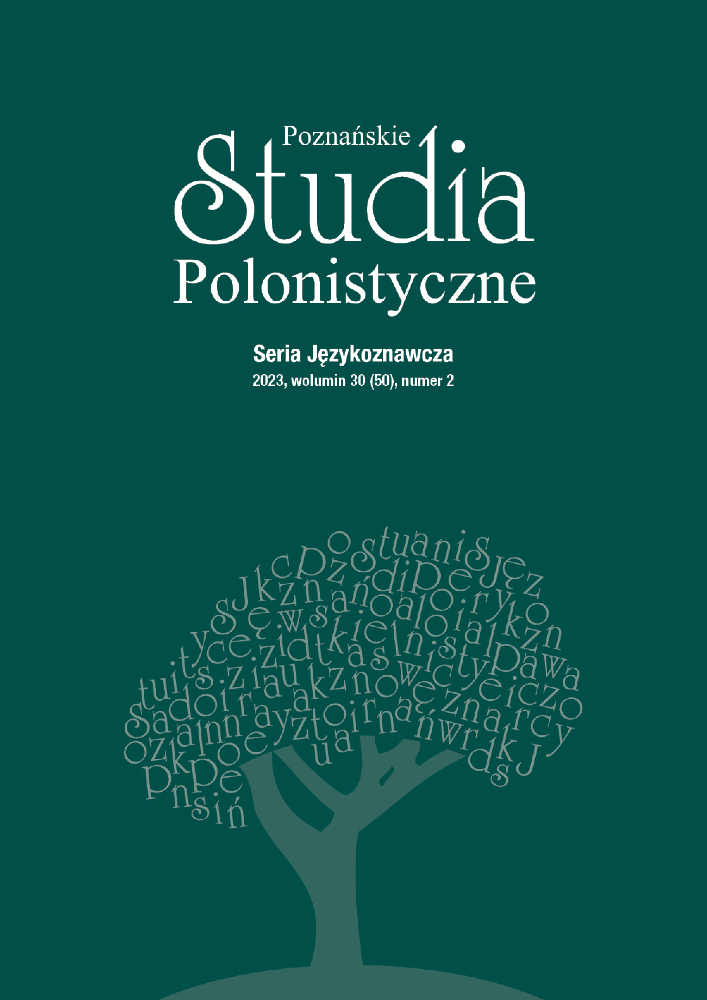Abstrakt
The media play a significant role in promoting a new model of motherhood, observed in social life in Poland. The aim of this article is to reconstruct the media’s portrayal of motherhood and maternity. The research material comprises titles and leads of press articles published on the online website mama:Du. The methodological foundation is drawn from the premises of cultural linguistics and the processes of concept profiling. The research material distinguishes profiles such as a suffering and exhausted mother, a single mother, an independent mother, a (non)working mother, and a mother as a woman. Analysis indicates that despite changes in the social perception of a woman’s role, the website presents a unidimensional image of motherhood, reducing women to the mother-child dyad. This image aligns with the stereotype of the mother as a caregiver. However, there are sparse signals of overturning these prevalent stereotypes in texts showcasing mothers who call for alteration of established norms. Nevertheless, the feminine aspect of a mother, as a woman who takes care of herself and has her own interests beyond caregiving duties, remains invisible. Thus, the medium reflects a realistic, consistent with Polish realities portrayal of motherhood and maternity, gradual striving towards its transformation.
Bibliografia
USJP – Dubisz Stanisław, ed. (2003), Uniwersalny słownik języka polskiego, vol. 1–4, Warszawa. Online: https://usjp.pwn.pl/ [accessed: 4 September 2023].
WSJP PAN – Żmigrodzki Piotr, ed., Wielki słownik języka polskiego PAN, Kraków, http://www.wsjp.pl [accessed: 3 August 2021].
Anusiewicz Janusz (1994), Lingwistyka kulturowa. Zarys problematyki, Wrocław.
Bartmiński Jerzy (2008), Polski stereotyp matki, “Postscriptum Polonistyczne”, no. 1, p. 33–53.
Bernardi Laura, Ornella Larenza (2018), Variety of Transitions into Lone Parenthood, in: Lone Parenthood in the Life Course, ed. Laura Bernardi, Dimitri Mortelmans, Cham, p. 93–108. DOI: https://doi.org/10.1007/978-3-319-63295-7_5
Biedroń Małgorzata, Mitręga Anna (2014), Solo-rodzice jako alternatywa tradycyjnych ról rodzicielskich, “Acta Universitatis Lodziensis. Folia Sociologica”, no. 51, p. 65–77.
Dzień Matki. Czy kobiety płacą alimenty? (2022), https://tinyurl.com/muc88z8k [accessed: 2 September 2023].
Keim Sylvia (2018), Are Lone Mothers Also Lonely Mothers? Social Networks of Unemployed Lone Mothers in Eastern Germany, in: Lone Parenthood in the Life Course, ed. Laura Bernardi, Dimitri Mortelmans, Cham, p. 111–140. DOI: https://doi.org/10.1007/978-3-319-63295-7_6
Kępa-Figura Danuta, Nowak Paweł (2006), Językowy obraz świata a medialny obraz świata, „Zeszyty Prasoznawcze”, no. 1–2, p. 51–62.
Kotlarska-Michalska Anna (2012), Główne kierunki przemian w kobiecych rolach małżeńskich i macierzyńskich, in: Wielość spojrzeń na małżeństwo i rodzina, ed. Anna Kwak, Mariola Bieńko, Warszawa, p. 87–115.
Krause Ewa (2020), Współczesna kobieta w kontekście macierzyństwa i roli matki, “Wychowanie w Rodzinie”, no. 1, p. 31–56. DOI: https://doi.org/10.61905/wwr/170458
Salter Emma (2018), A Media Discourse Analysis of Lone Parents in the UK. Investigating the Stereotype, in: Lone Parenthood in the Life Course, ed. Laura Bernardi, Dimitri Mortelmans, Cham, p. 55–74. DOI: https://doi.org/10.1007/978-3-319-63295-7_3
Szlachta-Ignatowicz Justyna (2022), Ewolucja stereotypu Matki Polki, „Przegląd Środkowo-Wschodni”, vol. 7, p. 221–232. DOI: https://doi.org/10.32612/uw.2543618X.2022.pp.221-232
Śniegulska Anna (2017), Przemiany roli matki w percepcji młodzieży akademickiej, “Wychowanie w Rodzinie”, no. 1, p. 305–322. DOI: https://doi.org/10.61905/wwr/170625
Startuje projekt Fearless Together – akcja, która pomoże kobietom rozwinąć karierę w finansach (2023), https://tinyurl.com/mw3bkr8y [accessed: 2 September 2023].
Strójwąs Aleksandra (2019), „Samotna” stygmatyzuje, „samodzielna” wymusza bycie dzielnym. Mamy problem z matkami wychowującymi w pojedynkę, https://tinyurl.com/strojwas [accessed: 2 September 2023].
Tokarski Ryszard (1998), Kulturowe i tekstotwórcze aspekty profilowania, in: Profilowanie w języku i tekście, ed. Jerzy Bartmiński, Ryszard Tokarski, Lublin, p. 35–52.
Tokarski Ryszard (2014), Światy za słowami. Wykłady z semantyki leksykalnej, Lublin.
Trysińska Magdalena (in print a), Rola dziennikarstwa parentingowego w kształtowaniu wizerunku matki i ojca na przykładzie serwisów Mama:Du i Dad:Hero. Ilościowa analiza zawartości treści, in: Współczesne media. Dziennikarstwo w czasach kryzysów, ed. Iwona Hofman, Danuta Kępa-Figura, Lublin.
Trysińska Magdalena (in print b), Współczesny obraz ojca i ojcostwa na przykładzie internetowego serwisu parentingowego dad:Hero, “Prace Filologiczne”, vol. 79.
Valiquette-Tessier Sophie-Claire et al. (2019), A Literature Review of Cultural Stereotypes Associated with Motherhood and Fatherhood, “Marriage & Family Review”, no. 4, p. 299–329. DOI: https://doi.org/10.1080/01494929.2018.1469567
Wierzbicka Anna (1999), Język – umysł – kultura, ed. Jerzy Bartmiński, Warszawa.
Żydek-Bednarczuk Urszula (2005), Wprowadzenie do lingwistycznej analizy tekstu, Kraków.
Licencja
Prawa autorskie (c) 2024 Magdalena Trysińska

Utwór dostępny jest na licencji Creative Commons Uznanie autorstwa – Bez utworów zależnych 4.0 Międzynarodowe.
Autorzy
Autor oświadcza, że przysługują mu osobiste i majątkowe prawa autorskie do utworu publikowanego w czasopiśmie „Poznańskie Studia Polonistyczne. Seria Językoznawcza”, oraz że nie są one ograniczone w zakresie objętym umową autorską, oraz że utwór jest dziełem oryginalnym i nie narusza majątkowych lub osobistych praw autorskich innych osób, ani innych praw osób trzecich, w tym dóbr osobistych.
Autor(zy) zachowują pełne prawa do dalszego, swobodnego rozporządzania utworem, udzielając Uniwersytetowi im. Adama Mickiewicza w Poznaniu niewyłącznej i nieodpłatnej licencji CC BY-ND 4.0 Międzynarodowe na korzystanie z utworu bez ograniczeń terytorialnych przez czas nieokreślony na określonych umową autorską polach eksploatacji.
Użytkownicy
Zainteresowani użytkownicy internetu uprawnieni są do korzystania z utworów opublikowanych od 2016 roku w „Poznańskich Studiach Polonistycznych. Serii Językoznawczej” pod następującymi warunkami:
- uznanie autorstwa – obowiązek podania wraz z rozpowszechnionym utworem informacji, o autorstwie, tytule, źródle (odnośniki do oryginalnego utworu, DOI) oraz samej licencji;
- bez tworzenia utworów zależnych – utwór musi być zachowany w oryginalnej postaci, nie można bez zgody twórcy rozpowszechniać np. tłumaczeń, opracowań.
Do wszystkich tekstów opublikowanych przed 2016 r. prawa autorskie są zastrzeżone.
Inne
Uniwersytet im. Adama Mickiewicza w Poznaniu zachowuje prawo do czasopisma jako całości (układ, forma graficzna, tytuł, projekt okładki, logo itp.).

